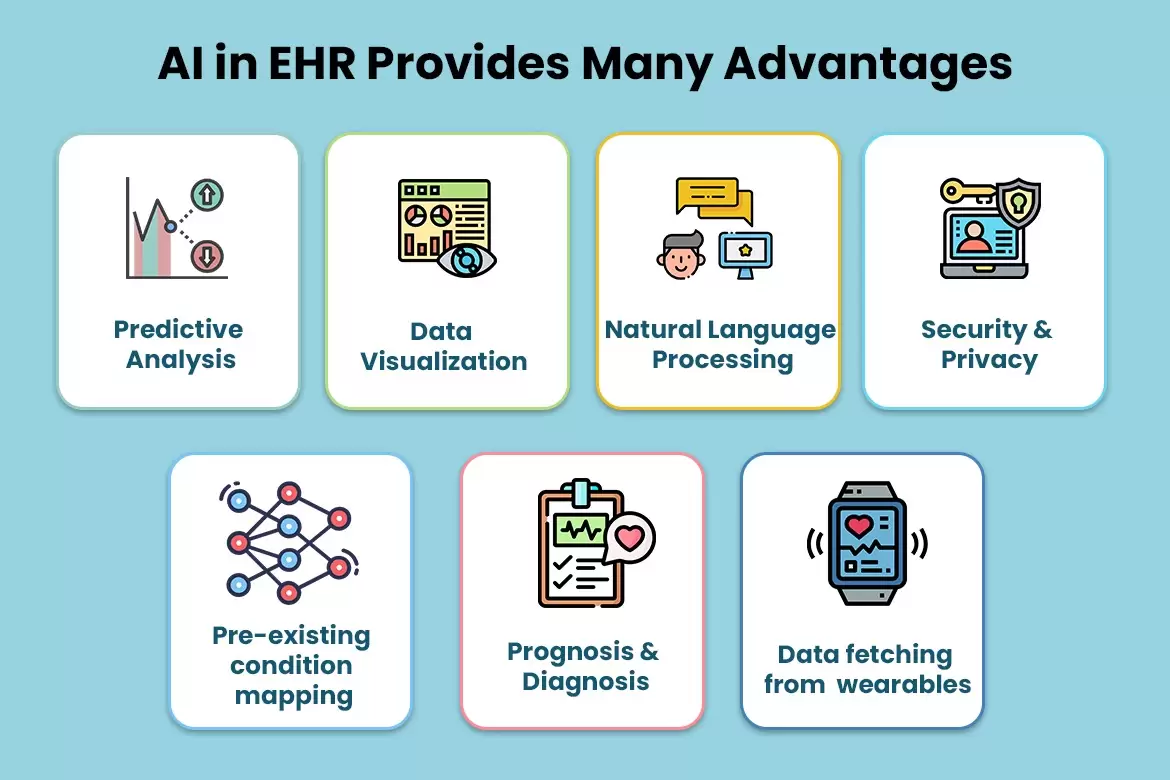
The introduction of Electronic Health Records made 3 promises – speed, access, and data sharing. There has been widespread adoption of Electronic Health Records (EHRs). However, despite the best intentions as well as immense government investment, there have been challenges. One of them is the effective collection and analysis of the massive amounts of EHR data collected were proving to be a bottleneck in the extraction of meaningful insights. A single patient can generate about 80 megabytes of data per year – this encapsulates the challenge faced with the accumulation of data from digital medical records after the advent of EHRs.
This is where the technological advancements in AI, Machine Learning, and Natural Language Processing (NLP) are showing that they could be the solution to analyzing the growing amount of EHR data being generated as well as automating many processes, easing the burden currently on healthcare workers and physicians.
Artificial Intelligence to physician rescue
The regulations under which the healthcare system in the USA operates require increased documentation from physicians. This has meant that clinicians are spending an inordinate amount of time on data entry rather than direct patient care.
According to a study, 62% of physicians’ time per patient is spent reviewing electronic health records (EHRs), of this, clinical data review is the most time-consuming.
AI in EHR uses new modalities such as speech recognition technology and digital scribes (AI-based voice-to-text) to reduce charting time. AI in EHR is also being used for improving data discovery and personalized recommendations.
Here are a few ways artificial intelligence is easing up work life for medical practitioners:
1. Automated clinical documentation: AI uses NLP-powered tools that can integrate with EHR systems. These can help automate data entry and management tasks, such as transcribing notes and extracting relevant information from documents. AI-based document digitization in healthcare can reduce the burden on healthcare providers and improve the accuracy and completeness of the EHR software system.
2. Clinical decision support: AI can help to analyze patient EHR data and provide recommendations or alerts to healthcare providers. This can help to improve the quality and safety of patient care.
3. Population health management: AI can help to identify patterns and trends in patient data, which can assist healthcare providers to identify and address population health needs.
4. Predictive analytics: AI-powered algorithms can predict patient outcomes and identify potential risk factors, which can help healthcare providers to prioritize care and intervene early to prevent negative outcomes.
5. Interoperability: AI can help to improve interoperability between different EHR systems, which can facilitate the exchange of patient data and improve the continuity of care.

Overall, AI can potentially improve the efficiency of EHRs by automating tasks, improving the quality and safety of patient care, and facilitating the exchange of patient data.
Predicted Trends that we will see in the next few years
AI systems may be integrated with wearable devices, such as smartwatches or fitness trackers, to collect real-time patient data and provide personalized recommendations.
AI might be more involved in analyzing an individual patient’s medical history, genetics, and other relevant data to aid the consulting physician in tailoring treatment recommendations to that specific person.
AI is already being used in the manufacturing sector to predict when machinery is likely to fail This use case might be adopted in the medical fraternity as well to predict when medical equipment is likely to go down and schedule maintenance accordingly, helping to reduce downtime and improve patient care.
Somewhere down the line, AI-powered virtual assistants may be used to answer patient questions and provide information about treatment options, medication instructions, and other health-related topics. Virtual assistants are a reality in most other customer-facing industries, however, the sensitive nature of healthcare might require a more advanced form than the technology currently available.
Many healthcare organizations are already on the AI bandwagon
There are many healthcare organizations in the US that are using artificial intelligence (AI) in electronic medical records systems. Some examples include:
Mayo Clinic has implemented a number of AI-powered tools, including a clinical decision support system that uses machine learning to provide treatment recommendations to clinicians.
Kaiser Permanente has an AI-powered predictive analytics system that identifies high-risk patients and provides recommendations for interventions to prevent complications.
Cleveland Clinic uses an AI-powered natural language processing system that extracts information from unstructured data, such as physician notes, to support coding and billing processes.
Partners HealthCare has implemented an AI-powered clinical documentation improvement system that automatically generates clinical documents, such as discharge summaries and progress notes, based on data in the EHR.
Geisinger Health System has an AI-powered population health management system that analyzes data from the EHR to identify trends and patterns at the population level.
What are the challenges in the wider adoption of AI in EHR?
While AI in EHR can herald many benefits for health organizations, smaller medical practices are hesitant about the new technological advancements. Many of their reasons are valid.
- Cost: Implementing AI in EHRs can be expensive, and many healthcare organizations may not have the financial resources or expertise to do so.
- Lack of standardization: There is currently a lack of standardization in the use of AI in EHRs, which can make it difficult for healthcare organizations to adopt and integrate AI solutions.
- Data quality and interoperability: In order for AI to be effective in EHRs, the data must be of high quality and the EHRs must be interoperable. However, many EHR systems still need to meet these requirements, which can limit the effectiveness of AI.
- Regulatory barriers: There are also regulatory barriers to the use of AI in EHRs, including concerns about data privacy and security.
- Resistance to change: Some healthcare providers may be resistant to adopting new technologies, such as AI, which can also limit its adoption and integration into EHRs.
Steps are being taken to encourage the adoption of AI in EHR
The United States government and other organizations are taking a number of steps to encourage the adoption of AI in EHR software, including providing funding, developing standards and guidelines, improving interoperability, reforming regulations, and providing education and training.
Funding: The National Institutes of Health (NIH) has funded several initiatives to support the development and implementation of AI in EHRs.
Standards and guidelines: The Office of the National Coordinator for Health Information Technology (ONC) has developed standards and guidelines for the use of AI in healthcare, including in EHRs.
Interoperability: The ONC has also supported efforts to improve the interoperability of EHR systems, which can facilitate the exchange of data and enable the use of AI in EHRs.
Regulatory reform: The Food and Drug Administration (FDA) has issued guidance on the regulation of AI in healthcare, including in EHRs. The Centers for Medicare and Medicaid Services (CMS) has also implemented policies to encourage the use of AI in healthcare.
Education and training: The NIH and other organizations have funded research and training programs to help healthcare providers understand and adopt AI in EHRs and other healthcare applications.
AI can be particularly beneficial for smaller practices since it can help to improve efficiency and reduce the burden of administrative tasks. Smaller medical practices that are interested in using AI should carefully assess the potential benefits and risks, and ensure that they have the necessary resources and infrastructure in place to support the technology. It may also be helpful to work with external their own EHR software. We are HIPAA compliant and have implemented EHR and AI solutions for numerous medical practices in America. Contact us today to know more about how we can help you. We usually get back within one business day.

